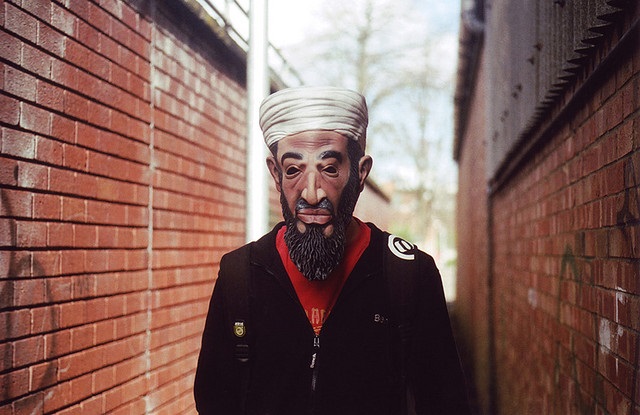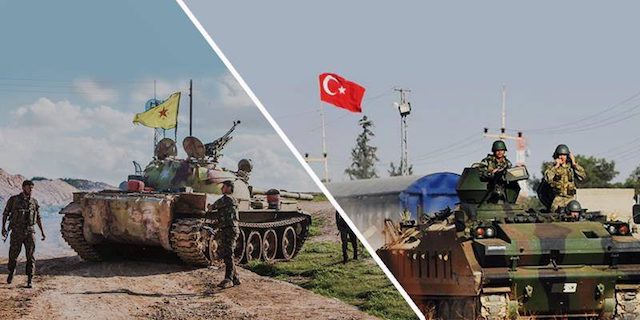Senior Muslim scholars are beginning to push back against Islamic State propaganda. Britain’s Faith Associates consultancy organized a four-minute video in July featuring many leading Sunni and Shia imams. They are joined by a stream of new fatwas from well-known clerics such as the Kerala-based Shaykh Abu Bakr Ahmad, as well as the Salafi firebrand Abu Qatada (who was once described as “Osama Bin Laden’s right-hand man in Europe.”)
This is a welcome trend, obviously. These scholars are helping immeasurably in framing the ISIS problem as one of militancy and extremism, rather than Islam as a religion. Fighting Islamophobia requires that non-Muslims see religious leaders like Sayed Ali Rizvi, head of Majlis Ulama-e-Shia Europe, casting jihadists as untrue Muslims, emphasizing that true Muslims are “united against ISIS, against terrorism, against atrocity, and against pain and suffering.” Otherwise, they’ll simply view Muslims as a monolithic bloc.
As a Muslim though, I’m sceptical of these discussions, especially when it comes to how many scholars and religious leaders are framing them. Consider another part of Rizvi’s quote, where he calls ISIS “cowboys” who “don’t represent the religion and are not qualified to represent the religion.” There are two problems here. The first is that saying that Muslims, even if they are violent jihadists, somehow don’t represent Islam is an informal fallacy. The second is that phrases like “qualified to represent the religion” can be quite reactionary if you aren’t careful. We’ll deal with them in respective order.
Western Muslims of my generation have spent our lives being instructed by our parents to tell people hounding us about our faith to say things like “al-Qaida isn’t true Islam. Bin Laden isn’t true Islam.” We were rarely, if ever, told what to say when our opponents were clever enough to note that we were using a makeshift No True Scotsman argument to avoid dealing with al-Qaida’s and Bin Laden’s undeniable presence in the Muslim ummah. Our response was to hold jihadis to an invisible standard of what Islam really is, that remained undefined. Informal fallacies in argumentation are easy enough to resolve, but they require clarity. We have to examine what “true Islam” actually means and why we would see jihadism as being excluded from it.
Citing the Qu’ran and hadith isn’t enough. Although an Islamophobic era has caused many of us to react by viewing Islam in a more romantic light, the Sunnah is actually quite ambiguous about violence. This is why there is enough room for interpretation in Islamic doctrine that leaders like the pacifistic anarchist Bacha Khan can belong to the same general canon as violent revivalists like Abul Ala’a Maududi and Sayyid Qutb. You can write a fatwa against terrorism, as Tahir ul-Qadri has done, almost as easily as you can argue that attacks like the suicide blasts that marked the Second Intifada are religiously valid under militaristic readings of the lesser jihad. There has always been a vibrant theological debate about the role that violence plays in Islam, and it has become manifest in modern debates about terrorism. We can reject one side of the debate, but saying that it isn’t “true Islam” is unconvincing and dishonest.
How should we discuss our rejection of jihadism, then? Many cosmopolitan liberals instinctively base their criticisms on history and philosophy, but the majority of Muslims that reject terrorism don’t commonly do so because of such intense intellectual reflection. It requires a familiarity with Islamic teachings that is actually out of reach for many people, who mainly understand their religion through the paradigm of inherited rituals and cultural precepts. This is not to say that such debates and stances aren’t important, but if the point is to discredit ISIS, and curb radicalization, then we need to reach people where they are. Equally, we also need to accept the fact there have been certain shifts in global Muslim consciousness that are here to stay.

For the majority of Muslims in the world, whether or not something is “Islamic” or not isn’t based on scripture. It is based on scholarly opinion, and their own independent evaluations of an actions’ moral and ethical validity, within the Islamic community. More often than not, the former is merely a formality. Clerics like Qadri are unconsciously trusted to express an existing distaste for violence and extremism, and are usually interchangeable. Here, the scholarly push-back is intelligent, because many Muslims simply need clerical permission to voice their existing opposition to jihadists on Islamic grounds. Qutb and Maududi aren’t as popular as fear-mongers would have you believe.
Importantly, though, we have to be careful about how much we trust clerics to be the arbiters of who is and isn’t “qualified to represent the religion.” Defenders of Islam frequently assert that it has an inherently peaceful character, rather than a violent one. Apart from being inaccurate, talk like this also happens to frame the religion in dangerously anti-democratic terms. Who is to say that Islam is inherently anything? Who gets to decide that fixed character, even the conversation is about its peaceful nature?
Isn’t it implied in Rizvi’s statement that he as a scholar is much more qualified to represent Islam than ISIS? Will that idea necessarily stop there? The scholarly ulema have always had a role in Islam that risks oppression. There is a line between providing spiritual guidance to the community, and actively prescribing its behaviour through authoritarian ideas of Islamic praxis. By trusting Muslim religious leaders so heavily, liberals are flirting with that line, even if it currently has an asset in combating terrorism and Islamophobia.
Jihadists are interesting because they sense the power present in these dynamics, which is why many of them reject clerical authority altogether. It isn’t a coincidence that they are doing this at the same time that globalization has emerged. Worldwide social and economic interactions have become so intense that they have overturned many classical certainties about what Islam is, and how it should be practiced. Many Muslims have responded in the same way: by emptying Islam of its traditional content, and redefining the religion for themselves. Jihadists are simply the most high-profile example, because their globalized ‘innovation, so to speak is so horribly violent. Like it or not, though, jihadis are closer to Islam as it is evolving than many establishment figures. The ulema in particular are witnessing their influence entering a steady decline.
It is true that many jihadists aren’t that familiar with Islam. That may not matter, though, since most Muslims aren’t all too learned when it comes to the religion either. Especially if they are young and grew up in the West. Jihadists look to it as an articulation of their own needs for liberty and transcendence, which were brought on by feelings of intense social and economic estrangement. This isn’t all too different from Muslims like those in The Taqwacores, who understand Islam as an individual process and remix it based on their own needs. Islam becomes seen as a loose banner for pursuing certain desires, and is stripped of both sanctioned religious practice, and the stifling control of the ulema.
Jihadism is simply about doing this brutally. The obvious issue is the vision of society that it proposes, along with the cathartic role that violence plays in it. The idea that drives their movement can be divorced from it, though: Islam as a fluid social contract that frames ethical relations. Whether this concept began with jihadism is debatable. It is clear though, that through the War on Terror, jihadists have both popularized it and opened it to new experimentation. It is difficult to imagine that so many Muslims and non-Muslims would be debating the nature of an Islamic state without terrorism as a global phenomenon. How else can we read Tariq Ramadan proposing a revival of ijtihad that is explicitly framed by a need for ethical counter-power? Even more significantly, how else can we read the fact that people are even receptive? The only question is where these discussions will end, which is anything but certain.
Photographs courtesy of Damien Heads and Joe Wolf. Published under a Creative Commons License.





